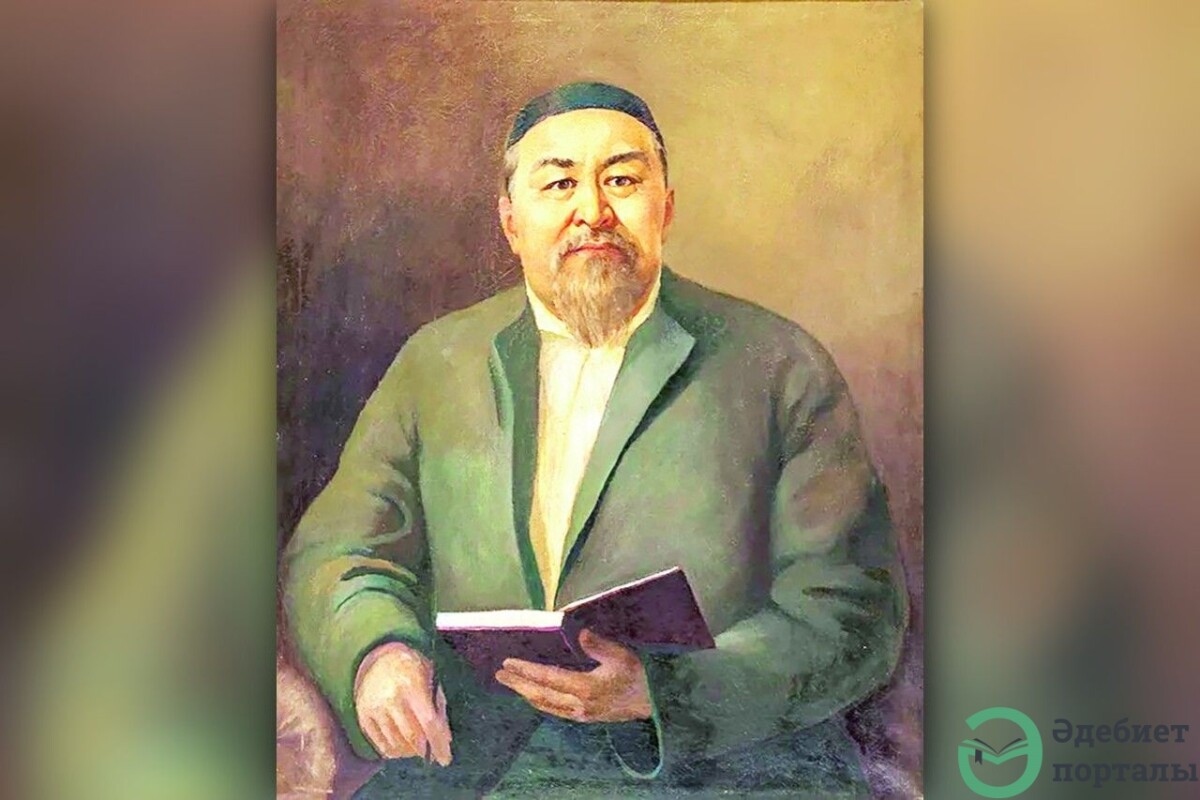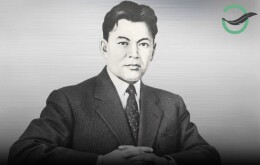Abai is a pinnacle of the Kazakh mind. A spiritual heritage left by Abai can be translated and propagandized at the high level not only by the Kazakh people, but also, in fact that Abai is considered as the “Abai of the world”. This is, because Abai is a scholar who left a deep impression to the scale of universal humanism.
The verses, poems, proses, songs are considered as the spiritual heritage of Abai. In this article, we will look at proverbs and sayings from Abai's proses. In his proses, Abai uses proverbs and sayings in order to clarify and substantiate the ideas expressed in the text. And, he pays a special attention to Kazakh proverbs and criticizes their content and ideas in several of his speeches.
In our article, we aim to show how these proverbs and sayings are used in modern Kazakh concepts of the XXI century, reflecting on the peculiarities of Abai's use of Kazakh proverbs and sayings in his speeches, in accordance with the times and society. And this step is not to criticize Abai's use of proverbs. On the contrary, we try to use these proverbs in order to show how much the modern Kazakh society has changed and advanced compared to the Kazakh society in Abai's time.
The behavior, moral situation of the Kazakh society of its time, and other categories of the qualities are described in details at Abai's proses. It is important to pay special attention for the use of proverbs and sayings at Abai's proses. Because Abai does not just simply use proverbs and sayings. First of all, as it was mentioned above, using the proverbs, he tries to express, think, weigh and prove the virtues and artistic qualities of our nation. Secondly, paying the special attention to the content of the Kazakh proverbs, he analyzes their ideological core, expresses a critical view of the educational value. Abai used the proverbs in the third, fifth, sixth, thirteenth, twenty-ninth, thirty-ninth, forty-third and forty-fourth proses. In particular, Abai uses the proverbs indirectly and takes them as the direct core of his speech. Now, let us consider the proverbs in each prose.
In the third prose, Abai explains: "Today there is a Kazakh proverb: If he doesn`t know what to do, he knows how to do', that means 'You can't do it right, but you can do it cunningly'." Another proverb in this prose is that it refers to the arbitration of power over various conflicts in the country. As Abai says: "People who knew the life of ancient Kazakhs said, 'If there are two judges, there will be four controversies'. It means that if there is no odd number, a couple of judges will quarrel and the controversies will increase". While acknowledging the significance of this proverb, Abai has criticized the tsarist government for electing the judges for three years and deliberately destroying the country. They say that it is better to choose the judges without a time limit.
In his thirteenth prose, Abai speaks about the faith and says that there are two ways to establish it to the heart: "Yakini" and "Taqlidi", that means, the first - through self-study, the second - by reading a book or under the influence of another person. “Let there be a face of that person who has the power of a false proverb: “There is no fear in the sword” and “God has no unforgivable sin”, Abai said, concluding that a person who has one word, a strong connection is well educated and he does not go for the hypocrisy, and he is a person of true faith.
In his forty-third prose, Abai says that eating, playing, laughing, dressing, driving, falling in love, career, power, in short, every passion and action is a measure, there is a limit and a sensible person should know this. He warns that if you ignore this limit and exceed it, everything will be in vain, and at the end it will look like: "The more you look for something interesting, the more you get burned". Passion, that is alien to the human morality, states that it should refrain from indulging in habits. Abai concludes that the only deterrent to these bad habits is the combined power of mind and strength.
In his thirty-ninth prose, Abai, referring to the many positive traits of the ancient Kazakhs, stated that as time went on, he gradually lost those qualities that were considered good. Abai said that in his time, there were only two of the virtues of the Kazakhs of the past, and now the Kazakh nation will be the nation, only if they are not separated from them. As the proverbs say: “Whatever these two personalities are, first of all, there will be people who will be the leaders of the country and the leaders of the group", "Take the sheep in a hurry, be careful, if you like it", "If you dance for each other, you will not fit in the tower, if you have a step, you will not burn in the fire". We have given you two reins and a chain, and when you give them, they will not be broken again, but will try to make up for what you have not achieved, to hide the bad and to exaggerate the good ...” In other words, a positive character of the Kazakhs of his time, that Abai consciously appreciated and wished not to disappear, concluded that the leaders of their own country would inevitably obey the famous citizen. That's why, Abai says that even though he is young, it is better to support a man with a fire in his heart, to hold the reins of power and trust him to carry the burden of the country. This is in line with Kazakh proverb: "If there is no man who considers his country as a country, then there will be no country called my man". Yes, the history has shown that Kazakhs found their way to the country with the help of men born for them in many difficult times. Abai says that this quality should not be lost.
In the thirty-ninth century, another good trait that Abai valued in Kazakhs had been a sense of dignity. Abai says: “The second character is the sense of dignity. Where a horse is called and a ghost is called, they do not resent their brother, they do not look at enmity, they put their lives on the line”, he said, citing the examples of several Kazakh proverbs related to the Kazakh unity and prosperity.
Let's look at five proverbs that Abai uses to describe the positive qualities of Kazakh people. For example, "He who is proud of himself, he cries from memory". To clarify the meaning of the proverb, a person who is devoted to his brother and respects him, does not it mean that one day he will be abused and suffer? In Abai's time, Kazakhs, who lived in a tribal-territorial integrity, had lived in obedience to the leader of their choice, adhering to the principle "If you drink - with your tribe." In those days, the honor of one person was the honor of the tribe. However, there are few people among the modern Kazakhs who have forgotten their tribe, we still cannot say that, they are united by tribal divisions as in the time of Abai. The steppe Kazakhs were urbanized, and the regions were intertwined as well. In this case, should yesterday's tribal honor be raised to the level of national honor? Modern Kazakhs, are we able to overcome this? The answer is clearly in our hearts and actions. If they say, "Your tribe is bad," they are going to die, and if they say, "Your nation is bad," what kind of dishonesty is this? These are the proverbs and sayings that Abai used in terms of a positive character. Now let's talk about the proverbs and sayings that were criticized by Abai.
In several of his speeches, Abai has his own critical views on the idea, that is reflected in the content of proverbs and sayings. For instance, in the fifth prose, Abai suggests that grief overflows from the eyes or from the tongue, and suggests that the view related to the property of the Kazakh society of his time can be recognized in the proverbs they used. To illustrate this point, the proverbs criticized by Abai are as follows: "If you have lunch, you have a day's livestock", "If you do not have it, your father is a stranger", "Cattle is the flesh of a man's liver", "The face of a rich man with many cattles is light, the face of the man with no cattles is grinding”, “A male`s food and wolf`s food are on the way”, "A man's cattle is in the country, when he is free", "The one who gave – breaks the curtain", “Give us your fist, then love and get it”, “A man who found the cattle has no plain", "Hopeless from Rich man – hopeless from God", "When you are hungry, run to the dark house", "From the lake without the help, from the land without the beggar". "What did these proverbs say?" Abai answered for these questions himself: “It turned out that the Kazakhs do not care for the peace, science, education, justice, they care about animals, but they do not know how to find the animals, all they know is that they deceive animals. He wants to take it or praise it, otherwise he will fight with it. As for the cattle, he is not ashamed to conquer his father. We shouldn't say that robbing, stealing, begging, and any other kind of deed, and finding cattle, should be punished”, he protests and criticizes whether this is a country.
Even though we agree with Abai Hakim's opinion, it is worth noting that his attitude to the criticized proverbs is a reflection of the notions of his time. It is a fact of life that the concepts and attitudes of modern capitalist society to the accumulation of wealth are more advanced, compared to Abai's time. That is why, we consider these proverbs with the knowledge of the Kazakhs of the post-communist capitalist era. It is definitely true that the proverbs "If you are hungry, run to the dark house", "Male's cattle is in the village, when he is free", "Cattle is the liver of the human" are a clear symbol of prosperity at any age. The words in the proverbs do not change. However, the initials are different, and the meaning of the refinement in the narrator may remain the same. According to this, today we are familiar with the saying "A child is a human liver" and its meaning is true.
"If you don't have it, your father is placeless". It is unknown when this proverb appeared in our folklore. Probably, it has appeared before Abai`s time. For a large group of current Kazakhs, isn't this conclusion accepted as a fact of life? Unfortunately, it is true that this is a clear fact of life for many families in a capitalist society.
"The face of a man with cattle is light, the face of the man without cattle is grinding". Obviously, my grandfather said this from Kazakh life itself. In today's world, what is the point of a person who has no home, no livestock, no money in his pocket?
"Man's food and wolf's food are on the way". In terms of stealing or snatching food from someone, in terms of a ready-made spoon, we do not look at this in the same way as in Abai's time. In the modern comprehension, we can consider this utterance in the context of the notion of " The spider hangs on the walker " or "There is a place for a good person".
The meanings of Abai`s proverbs "The one who gave breaks the curtain", "The hand I received was given" are basically the same. If we take it as a weed-like gesture of bribery, "The one who gave breaks the curtain" is not a good thing. However, if we look at where and what to give in the situational context, it is also "The hand I received was given", is a characteristic of close, partnership between people in the age of market relations.
"A man who found the cattle has no plain". In his statement, Hakim Abai said that he took it in the context of stealing or looting someone's property. Therefore, this negative act was strongly condemned by Abai. And if we look at this concept in the context of the saying "Even if you wash the back of a donkey, you will find the cattle", in fact, "A man who found the cattle has no plain". Of course, if you earn money through your honest work.
To be continued...












